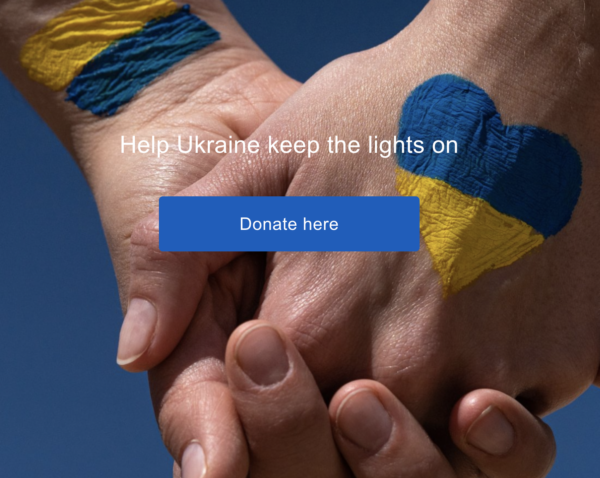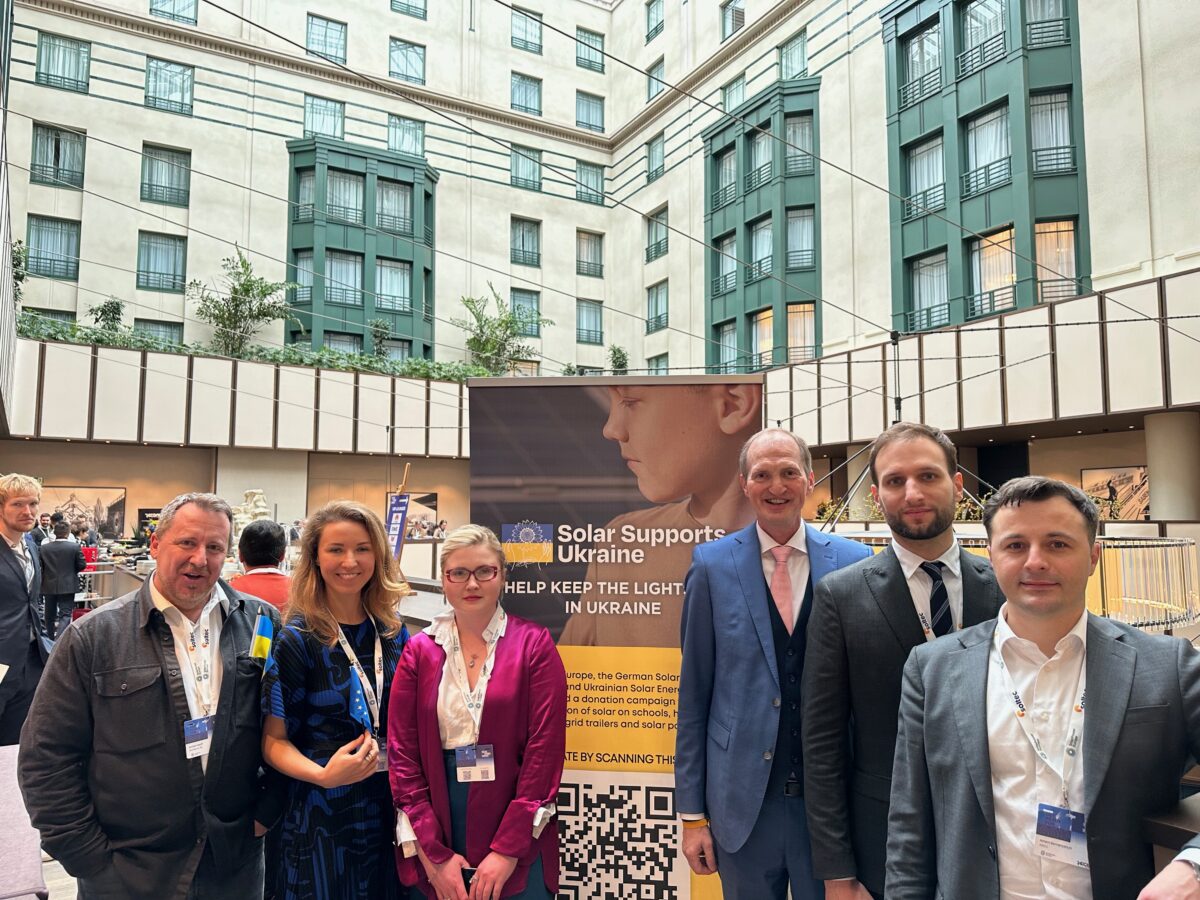Europe’s solar industry has launched a new PV equipment donation scheme for Ukraine. The announcement was made during SolarPower Europe's annual summit in Brussels and aims to give Ukraine a steady supply solar materials.
Russia's invasion of Ukraine sparked a solar rush across Europe as people sought to combat rising costs of energy with rooftop solar. In Ukraine, however, the energy system has been bombarded, leaving schools and hospitals in desperate need of solar and battery storage systems.
“In war, it is always the most vulnerable who suffer the most,” says German solar associations BSW co-president Jörg Ebel. “This is why the German solar industry wanted to contribute to this campaign and kick off our ‘Solar Aid’ initiative so that we could equip schools with an improved electricity supply system.”

Photo: Solar Power Europe
Russian missile strikes frequently target energy infrastructure, ensuring power outages are commonplace nationwide. “We have seen that the war caused tremendous energy poverty among the population,” said Director of Global Affairs at SolarPower Europe Maté Heisz. “And solar can really help to alleviate this energy poverty.”
The resulting demand for backup power sparked action from SolarPower Europe, the German solar power industry associations (BSW) and Ukrainian counterpart (ASEU) to launch the Solar Supports Ukraine donation campaign.
Since the war began, numerous European companies have started donating truckloads of modules, batteries, inverters, and cables into the area. The new initiative aims at providing a coordinated platform and logistical plan for donations.
Ukrainian cooperation
Ukrainian organizations including Energy Act for Ukraine Foundation and the Repower Ukraine Foundation will enable and organize the implementation of the projects. The groups understand the needs of hospitals and schools and can conduct preliminary project assessments. The two organizations seek donors who fund specific projects and tender the implementation to Ukrainian electric installers.
To ensure transparency, corporate donors can view the detailed calculations of the selected project. “The donors can take guardianship over an entire project and this allows for an efficient delivery by enabling Ukrainian installers” explains Jochen Hauff, director of corporate strategy at BayWa re, among the first corporate donors of the campaign.
Rather than donating some modules or an inverter, a company can implement a complete PV system. Hauff explains that this saves on the coordination of component delivery and compatibility when a single installation can include donations from five or six different donors.
SolarPower Europe's Heisz said the deployment of solar to Ukraine needs to be accelerated, “hence we need to make it simple and empower our Ukrainian partners to scale up.” Heisz added that this call is already being heeded, with more than €70,000 donated from private donors before the summit.
“Currently, in unprecedented power shortages surgeons had to rely on headlamps to continue to operate,” says Artem Semenyshyn, CEO of the Solar Energy Association of Ukraine. In 2022, ASEU member companies installed battery storage systems at a hospital in Kharkiv. Semenyshyn says doctors from that hospital are pleased with the performance of their solar battery backup system. Considering diesel gen-sets need one minute to fire up properly and the donated battery system can provide uninterrupted power supply, this is no surprise.
But there are many more hospitals where that came from. Since the invasion, Ukraine’s government has mandated hospitals purchase backup power supply systems but left open whether to use diesel gen-sets or solar battery systems. Some 4,500 larger hospitals require backup power. If equipped with a diesel gen-set, each would use about 200 liters of fuel daily and would not have uninterrupted power supply functions.
Rebuilding the country with solar
Eventually, Semenyshyn is convinced that if the government can see the resilience and usefulness of solar, he can make a great case in favor of rebuilding the country with the help of photovoltaics.
And for that, he needs more installers. But Semenyshyn has a plan. Apart from keeping the lights on, the program can also help injured civililians and soldiers too wounded to return to the frontlines, or those who are likely to lose their jobs. The CEO of ASEU says those who are wounded and traumatized can be retrained to install solar systems and help rebuild the country with solar power.
At present, the project pipeline comprises three projects relating to schools and hospitals, one of which has been readily installed in Irpin, one is under construction, and one has been financed and is poised for construction in a few weeks.
“We appeal to our members and to energy industry stakeholders for more donations to this cause,” says Ebel. “Every contribution will go a long way.”
This content is protected by copyright and may not be reused. If you want to cooperate with us and would like to reuse some of our content, please contact: editors@pv-magazine.com.




2 comments
By submitting this form you agree to pv magazine using your data for the purposes of publishing your comment.
Your personal data will only be disclosed or otherwise transmitted to third parties for the purposes of spam filtering or if this is necessary for technical maintenance of the website. Any other transfer to third parties will not take place unless this is justified on the basis of applicable data protection regulations or if pv magazine is legally obliged to do so.
You may revoke this consent at any time with effect for the future, in which case your personal data will be deleted immediately. Otherwise, your data will be deleted if pv magazine has processed your request or the purpose of data storage is fulfilled.
Further information on data privacy can be found in our Data Protection Policy.